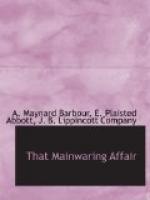“I discovered that impress on the blotter on this desk one morning about ten days after the tragedy, and at once recognized it as my father’s writing. In a flash I understood the situation; my father himself had returned, had been in these rooms, and had had an interview with his brother! I knew of the marked resemblance between them, and at once questioned, How had that interview ended? Who was the murdered man? Who was the murderer? That was the cause of my trip to England to try to find some light on this subject. I need no words to tell you the agony of suspense that I endured for the next few weeks, and you will understand now why I would not — even to yourself — declare my innocence of the murder of Hugh Mainwaring. I would have bourne any ignominy and dishonor, even death itself, rather than that a breath of suspicion should have been directed against my father’s name.”
“My hero!” she exclaimed, smiling through her tears; then asked, “When and how did you learn the real facts?”
“Almost immediately upon my return to this country, and from Mrs. LaGrange,” and he told her briefly of his last interview with that unhappy woman. “Up to the day of the funeral, she was ignorant of the truth, but on that day she detected the difference, which none of the others saw. She knew and recognized my father.”
Standing at last on the western veranda, they took their farewell of Fair Oaks.
“Beautiful Fair Oaks!” Winifred murmured; “once I loved you; but you could never be our home; you hold memories far too bitter!”
“Yes,” Harold replied, gravely, “it is darkened by crime and stained with innocent blood. The only bright feature to redeem it,” he added with a smile, “is the memory of the love I found there, but that,” and he drew her arm closely within his own, “I take with me to England, to my father’s home and mine.”
Together they left the majestic arched portals, and going down the oak-lined avenue, through the dim twilight of the great boughs interlocked above their heads, passed on, out into the sunlight, with never a fear for shadows that might come; each strong and confident in the love that united them “for better for worse, for richer for poorer, in sickness and in health, . . . till death us do part.”



